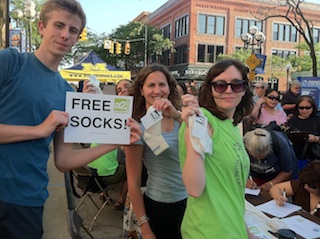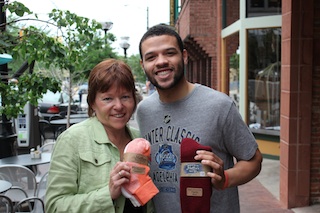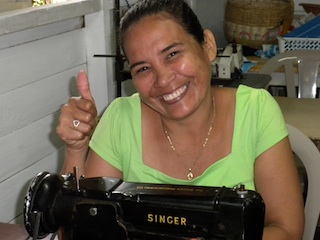
Maggie's Organics founder Bená Burda began her career in the organic industry as an order-taker for Eden Foods in 1978, where she first learned about sustainable agriculture from a group of Michigan organic bean farmers. After spending the next ten years marketing and selling organic grain and bean products, she moved to California to work as the VP of sales and marketing for Little Bear Organic Foods. It was on an organic inspection for Little Bear that a farmer inadvertently taught Bená about the hazards of conventional cotton, and from there the idea for Maggie's was born.
Maggie's Organics' mission was to convert as many acres of cotton from conventional to organic production as possible. Soon after, the company began to adopt fair labor practices as Bená helped to form a number of 100% worker-owned cooperatives in Nicaragua and the US. In May 2002, Bená was recognized by the Organic Trade Association with the prestigious "Special Pioneer Award", and in 2004, she was voted one of the "25 People who Most Influenced the Organics Industry".
Posted By: Bena Burda
Posted: 6/20/2012
 Maggie's Organics
Maggie's Organics is thrilled to be hosting the
Concentrate blog and getting a chance to reach out directly to our local community.
First, we would like to say that we had a blast earlier this month at the
Green Fair and
Mission Zero Fest with
a2energy.org! Thank you to all who stopped by, we hope you are enjoying your free pair of Maggie's a2energy socks! (If you missed out, click
here).
In the spirit of these great local events, we wanted to talk a little bit about why our Michigan community is so important to us. There is no doubt that Maggie's Organics has always been focused on the "big picture", establishing worker-owned cooperatives and developing fair trade and organic standards internationally. But as our business grows, it has been easy to lose sight of our local community and what it has meant to us throughout the years. A2 and now Ypsi have been incredibly supportive places for a company like ours to call home, and meeting old and new friends at various events over the past few weeks has inspired us to reflect on our recent 20-year birthday and the value of our local roots.
Maggie's beginnings can be traced back to a small condo on the west side of Ann Arbor in 1992, where orders were processed on the kitchen table and invoices were filed next to the bed. After moving to California for a few years and buying her partner out in 1997, Maggie's founder Bená Burda followed her heart and chose to come back home, first to Ann Arbor and now to Ypsi. Though an unpopular decision at the time, it turned out better than anyone could have expected. Maggie's loves calling Southeast Michigan home for the same reasons that many of us are drawn to live here year after year: a community of creative minds, a collective spirit of support, and a vibrant multicultural environment, all embedded within a grounded Midwestern atmosphere.
We are also particularly grateful for residents' passion for environmental sustainability and social consciousness, which is why we are so excited about our recent collaboration with the city's
Clean Energy Coalition. We created a special Maggie's organic cotton sock with the a2energy.org logo, which was introduced at the Green Fair and Mission Zero Fest. The socks are being used to educate us all in conserving energy as we help our eco-city grow more green. What started out as a quick conversation with A2's Environmental Coordinator Matthew Naud has evolved not only into a cozy organic cotton sock, but it has also made Maggie's realize how crucial it is that we engage locally.
So while we appreciate that local residents may buy Maggie's products because they share our values of environmental sustainability and social responsibility, we don't want our interactions to be limited to an occasional purchase of our merchandise. Just as we have worked hard to develop personal relationships with the 2,000 farmers growing our organic cotton in Nicaragua and the families in North Carolina that knit each pair of our socks, we want to continue strengthening our connection to the vibrant Michigan community in which we live, work and play on a daily basis.
As we look forward to spending more time with the residents of Ypsi and A2 in the future, we want to pause and offer our heartfelt thanks to those that have supported us throughout the years. Sometimes it can be easy to lose sight of your immediate surroundings as a business, but we know that without this local encouragement, we would not be sitting here today. Our ultimate goal is to ensure that the connections Maggie's has built within this dynamic Michigan community remain an integral part of our values and our identity.
A2 Energy.org photo courtesy of Maggie's Organics
Posted By: Bena Burda
Posted: 6/20/2012

Having been a fair trade and organic company since our inception 20 years ago, we believe that what makes Maggie's Organics most unique is our involvement in every step of the complex apparel
supply chain. From the day the 2,000 co-op farmers plant their organic cottonseed to the day the last color is added to our Tie Dye socks, we are constantly engaged with all of our producers. It is this collaborative effort among many voices that we believe characterizes us as a business. Our next goal is to take these efforts beyond our global production chain and work to develop more local collaborations with the many creative designers, innovators and entrepreneurs right here at home.
Since Maggie's began in 1992, we have helped to establish three 100% worker-owned cooperatives around the world: independent production houses that sell to a variety of clients (including Maggie's) and share all the profits among the workers. The first co-op (called the Fair Trade Zone) was formed in an economically ravaged area of Nicaragua, and it has since given over 50 hurricane refugees in the area a chance to earn an independent income in order to determine their own futures. Boasting tremendous success as the world's first worker-owned "free trade zone", the Fair Trade Zone now runs completely autonomously with a customer base stretching across several continents.
After also establishing cotton gin cooperatives and farmer cooperatives in Nicaragua, we helped bring the idea of worker-owned co-ops to the U.S. in 2008 by forming
Opportunity Threads in Morganton, NC. Like the Fair Trade Zone, this is another 100% worker-owned business that is busy creating all sorts of products for Maggie's (and other customers), most notably our
Tie Dye Chickens, which are handmade from irregular Maggie's socks.
As we continue to maintain strong relationships with these cooperatives and the integral role they play in Maggie's global production chain, we have begun to forge new partnerships here as well.
We recently met with former University of Michigan basketball player
David Merritt, a talented 26-year-old who has already founded his own socially conscious fashion brand. Called
"Merit", his company aims to create stylish clothing products that will, in his words, "help committed, disadvantaged youth attain a college education" by putting 20% of the brand's revenue into college scholarships for underserved communities. We are excited at the prospect of connecting with more local entrepreneurs like David, and it is inspiring to see young voices like his generating positive social change in our community.
We are also collaborating with Rachel Blistein of
Original Moxie – an Ypsi-based line of natural hair products – to develop a new line of Maggie's hair accessories, which will be made from our signature organic cotton and are set to be released this fall.
Apart from collaborating with like-minded businesses and leaders, Maggie's latest project is to start a worker-owned sewing cooperative in Southwest Detroit. The
Michigan Economic Development Corporation (MEDC),
Detroit Community Cooperative, and
Urban Neighborhood Initiative are already involved, and though this will no doubt be a challenging project, we are optimistic that it will happen. We are energized by the recent efforts taking place to revitalize Detroit, especially among youth. In fact, Maggie's most recent intern (and recent University of Michigan graduate) Alan Sedghi has moved to Detroit for
Green Economy Leadership Training (GELT), a program run by our friends at
Global Exchange. Check out
Alan's work on Maggie's new homepage and
videos!
Overall, we are very excited to begin a new chapter of collaboration at Maggie's, and translate what we know from our global efforts with worker-owned cooperatives into a dynamic set of projects within our local Michigan community.
Bená Burda and David Merritt photo courtesy of Maggie's Organics
Posted By: Bena Burda
Posted: 6/20/2012

So what does the term "fair trade" really mean? Some of you might be surprised to learn that the leaders shaping the movement from within can be just as perplexed by this question as the consumers trying to understand it through news articles and packaging labels.
Many of us are increasingly aware of the labor exploitation that pervades all different types of global production chains, be it a plantation or a sweatshop. So it makes sense that when we buy something, we want to be reassured that our purchases are promoting fair wages and good working conditions for its producers. This attitude is the essence of fair trade, a movement whose growth over the last few decades has led to the creation of numerous third party certification labels, each with a different set of standards and goals. At the same time, growing awareness about the phenomenon of "fairwashing" (like "greenwashing") has made many people skeptical about the truth behind companies' fair trade claims. We may try to simplify our choices by seeking out familiar labels from a certification agency that we trust, but it is important to realize that fair trade products cannot be reduced down to a basic choice between "certified" or "not". No label is a panacea for worldwide labor exploitation, and there are many conflicts and compromises that underlie fair trade certification systems.
This idea has been given new prominence with the controversy surrounding Fair Trade USA's recent
decision to allow large coffee plantations and private estates to apply for fair trade certification. While some believe that giving more coffee industry players the chance to adopt fair trade principles is ultimately a good thing, others
argue that this will weaken both fair trade standards and the movement's original mission of empowering small farmers to compete in the global market. Many point out that the inclusion of coffee plantations will make it even easier for large companies to certify only specific product lines under their existing production facilities, a technique that is often resented by the 100% Fair Trade companies who take great care to ensure that each product is fairly produced.
These arguments over coffee certification standards are relevant for the rest of the fair trade movement as well, including the apparel sector in which Maggie's is involved. We have been very proactive in seeking out third party certification for Maggie's products, but in the process we have learned that earning a label is not necessarily the most effective way to adhere to our fair trade principles.
Over the last two years, Maggie's has spent over $60,000 in order to meet fair trade certification requirements – regulations that the farmers and producers who make our products have largely found to be cumbersome, restrictive, and not very financially beneficial for themselves or their organizations. This is why we have recently begun to use alternative methods of conveying our fair trade story, such as detailed step-by-step
disclosures of our supply chains and thorough third party rating systems like
free2work.org.
As a 100% Fair Trade company, we strive to stay connected with our producers and the reality of their working conditions, so for us being "fair trade" goes far beyond the presence of a certification hangtag. We want our brand's integrity and transparency to clearly show that Maggie's products embody the welfare and satisfaction of every worker in our chain.
After years of experience in the fair trade movement, Maggie's defines fair trade as an aspirational method of commerce that is still evolving as it seeks to level the playing field for all workers around the world. We hope to inspire more fair trade consumers to look beyond labels and to get to know individual brands and the producers behind their products. It is through this insight that the world can truly become fair.
Photo of co-op employee in Nicaragua courtesy of Maggie's Organics